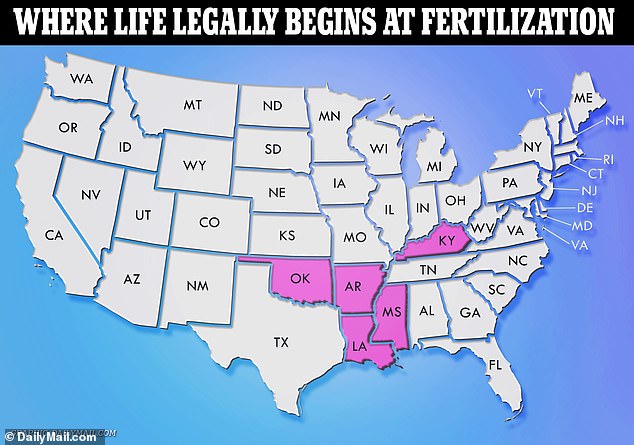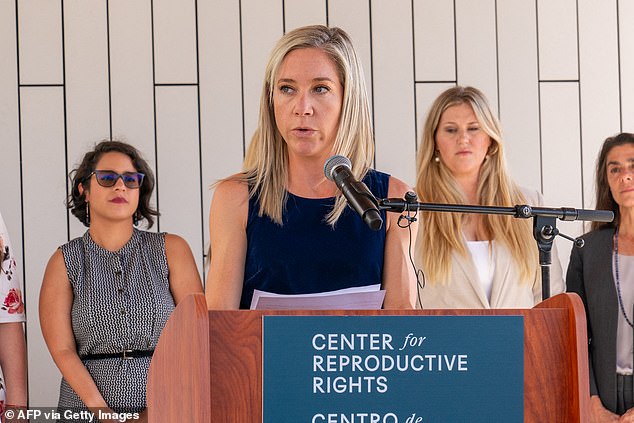Women in red states begin moving their frozen embryos out of state, fearing Alabama court ruling that embryos are children
After a recent court ruling in Alabama ruling that frozen embryos are children, women in red states have begun transferring their embryos to locations with fewer restrictions on reproductive health care.
Amanda Zurawski, 36, of Texas, has chosen to move her frozen embryos out of the state out of fear that lawmakers could follow Alabama’s lead and prevent her from starting a family on her terms.
Meanwhile, Meghan Cole, 31, of Alabama, is considering moving her frozen embryos to New York or New Jersey, both blue states that are unlikely to restrict in vitro fertilization (IVF).
Alabama ruled last week that when a person dropped several frozen embryos into a fertility clinic, the clinic violated the state’s Wrongful Death Act — which defines a wrongful death as someone dying as a result of someone else’s wrongful act or negligence — and determined that frozen embryos are like humans.
Frozen embryos are eggs that are removed from a woman’s ovaries and fertilized with sperm outside the uterus. If not immediately implanted in the uterus, they can be stored for years. In some cases, however, embryos are discarded because of genetic defects or because someone no longer needs them.
Now, IVF clinics and doctors in the state are pausing certain IVF procedures out of fear that if they discard embryos, they could be sued for wrongful death.
Amanda Zurawski, 36 from Texas (pictured right with her husband) has chosen to move her frozen embryos out of state out of fear that her state would follow Alabama’s lead and prevent her from starting a family on her terms

A handful of Republican-led states have declared that life begins the moment an egg is fertilized
Ms. Zurawski said the IVF process is scary enough on its own, but the ruling and the subsequent closure of some clinics in Alabama have added “another layer of fear and anxiety.”
Zurawski is one of the lead plaintiffs in a lawsuit alleging that Texas’ abortion ban endangered her life when she suffered septic shock and nearly died in 2022, when she was 18 weeks pregnant.
Doctors refused to perform an abortion because the fetus still had a heartbeat. In Texas, all abortions are banned, except in cases where the life of the mother is saved.
The experience led her to try IVF and hopefully have a baby through a surrogate mother, after doctors told her she couldn’t carry a baby to term.
But the legal landscape in Texas, coupled with the fear that followed the Alabama court ruling, convinced her and her husband to look to other states to store the embryos.
Ms. Zurawski, who spoke exclusively NBC Newssaid: ‘It’s absolutely terrifying.
“But it’s also so infuriating because the same people who support the bans that almost cost me my life are also in the same camp and are now making it harder for people like me to have a family.”
Meanwhile, Mrs. Cole said she is also scrambling to move her embryos to an “IVF-friendly” state like New York or New Jersey.
Mrs Cole cannot carry a child herself for health reasons and was planning to use a surrogate mother, who traveled to Birmingham LAST WEEK for an embryo transfer? when she heard the clinic had closed its doors.
She said: ‘I’m scared of what to do with the embryos that remain frozen.
‘It just didn’t occur to me that I could ever be held liable for the normal disposal of embryos… It’s a cluster of cells… they can’t live outside the freezer… So yeah, this was quite blinding.’
So far it is not known whether the owners of the embryos can be brought to justice. All the decision said was that parents of a destroyed embryo can sue the person who did it for wrongful death.
And as of now, women in Alabama can still save their fertilized eggs.
Alabama Fertility, where Meghan Cole is a patient, shared a statement on social media following the court ruling: “We have made the impossibly difficult decision to postpone new IVF treatments due to the legal risk to our clinic and embryologists.
“We are working as hard as we can to warn our lawmakers of the far-reaching negative consequences of this ruling for the women of Alabama.”
After the Alabama court ruling, three clinics in the state closed their doors out of fear and confusion.

Zurawski is one of the lead plaintiffs in a lawsuit alleging that Texas’ abortion ban endangered her life when she suffered septic shock and nearly died in 2022, when she was 18 weeks pregnant.

In vitro fertilization involves removing eggs from a woman’s ovaries, fertilizing them outside the uterus and implanting them into the woman’s uterus (Stock Image)
Although traveling abroad to store embryos is an option, it can be prohibitively expensive.
The average IVF cycle can cost anywhere from $12,000 to $17,000, including egg retrieval and mixing the eggs with sperm, but excluding medications. The cost of freezing embryos ranges from $1,000 to $2,000, with additional storage costs of $500 to $1,000 per year.
Traveling out of state comes with a slew of additional costs.
Ms. Zurawski said, “I think about the people in Alabama who might be considering doing the same thing, and it’s not an option for everyone.
‘IVF in itself is extremely expensive. And then, to add an extra layer that she may need to transport. It’s just another expense. It’s more logistics. They are more unknowns.’
Mrs. Zurawski declined to say where she and her husband would move her embryos “to protect us.”
Texas’ abortion ban includes exceptions for the life and health of the mother, but the steep six-figure fines and prison sentences have a chilling effect on the entire healthcare landscape there.
As a result, patients in Texas have suffered serious complications and devastating consequences.
One case that recently made headlines across the country was that of Katie Cox, who was told by her doctor last summer that her fetus had been diagnosed with a trisomy and would not survive more than a week if she were allowed to carry the pregnancy to term. being carried. An induced labor can rupture her uterus if it dies in the womb.
Despite the risk to her life, she had to go to court and seek permission for an immediate abortion, but the state did not allow it until December, while in New Mexico she received the procedure she needed.
In 2022, the Supreme Court ruled in Dobbs vs Jackson, overturning federal abortion protections established in 1973 by Roe vs Wade. Almost immediately, states began enacting abortion restrictions, and now fifteen states have a complete ban on the procedure.
Advocates of abortion rights and IVF have since feared that reproductive technology could also be at risk, as a handful of red states have passed laws giving fetuses the same rights as humans.
Barbara Collura, CEO of Resolve: The National Infertility Association, said: ‘This is exactly what we were afraid of and worried about.
“We are extremely concerned that this will now happen in other states.”
